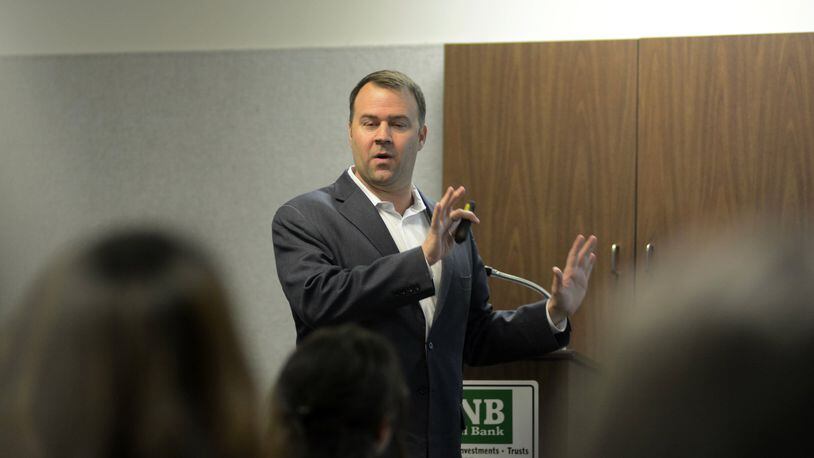MORE: What do you want Gov. Kasich to focus on in 2017?
But Pepper, who was elected as the Ohio Democratic Party chairman in December 2014, said many of the voters that supported Trump this past November “had reservations,” and many of those were undecided or uncommitted voters who may have voted Democrat in the past.
“They saw him as change enough they were willing to overcome those reservations, but I think in the end there’s opportunities out of this,” Pepper said. “We can be change in ‘18.”
In order for Democrats to be political change in Ohio, that would take a lot of grassroots organizing and party building, said Miami University Regionals political science professor John Forren.
“They need to work to get back the Trump voters who voted Democratic in the past,” he said. “It’s an uphill climb — but my sense is that 2018 might be a pretty good year for the Democrats.”
Forren said historical trends will work in their favor, such as the president’s party often suffers a setback in the mid-term elections. And some Republican strategists already are issuing warnings concerning the GOP-controlled Congress and GOP-controlled Statehouse about “a significant risk of conservative overreach and an over-reading of the meaning of the 2016 election,” he said.
“If the Republicans govern too far to the right, they run the risk of alienating a lot of their voters — and that will open up a significant opportunity for the Democrats both at the state level and at the national level,” Forren said. “All that said, the Republicans are clearly the beneficiaries of gerrymandered districts — which will still be in place in 2018.”
Pepper said Democrats can fix the gerrymandered districts, which is supported by the fact that congressional Republicans outnumber congressional Democrats 12 to four, if they win in 2018.
But getting back to Democratic Party basics is key for the 2018 election, Pepper said, which includes sticking to the issues, building the bench, and improved canvassing by talking with undecided and uncommitted voters. Those voters, Pepper said, were essentially ignored by the Democratic Party in 2016 and they chose Trump.
Winning Ohio will begin with the top of the ticket. While the budget and economy will be a key issue in the 2018 race for governor, Pepper said issues that will need to be addressed are heroin epidemic and education.
Ohio ranks No. 1 in opioid overdose deaths (2,106) that were reported in Ohio in 2014, beating out higher population states of California (No. 2 in opioid overdose deaths) and New York (No. 3 in opioid overdose deaths), according to the Henry J. Kaiser Family Foundation.
MORE: Portman to re-introduce bill aimed at U.S. mail shipment of drugs
Ohio’s opioid overdose deaths were nearly half in 2010, according to the Kaiser Foundation.
“Right when that crisis hit were defunding local communities, first responders support, treatment support, we defunded schools that were supposed to be doing prevention,” said Pepper.
Concerning education, Pepper said, “Our schools are falling apart.”
“When Ted Strickland left office, we were fifth in the country in our ranking in public education. We are now 23rd,” he said. “We’re literally trailing the rest of the country.”
Education Week’s latest Quality Counts report issued a “C” on its 2017 state report card, indicating Ohio ranks 22nd in the nation. The state was 23rd in the 2016 report.
Pepper touched on the 2018 governor’s race, saying they have a slate of potential candidates — including Dayton Mayor Nan Whaley, former Ohio Attorney General Richard Cordray, and former state lawmakers Connie Pillich and Nina Turner — will be the “change” against the status quo candidates on the Republican side.
On the Republican side, candidates and potential candidates include Ohio Attorney General Mike DeWine, Ohio Secretary of State and Ohio Lt. Gov. Mary Taylor.
“Whomever wins that (Democratic) primary will have earned it,” Pepper said. “Let them all run. The best man or woman will win and I think we’ll be a better party for that.”
And Pepper said “the politics of ‘next up’ is over,” which was proven when Trump beat more than a dozen Republican hopefuls, including an early favorite former Florida Gov. Jeb Bush, and with former President Barack Obama when he bested Hillary Clinton in 2008.
“Bottom line, (2016) was a very tough result and there are some clear reasons why we didn’t do well and there are reasons why in ‘18 we can do well.”
About the Author
